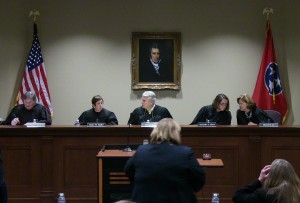 From its launch in 2009, Belmont’s College of Law has focused on the goal of graduating practice-ready attorneys who are prepared for today’s global legal market. With the College’s first commencement just three months away, Belmont Law showed again why it practices what it preaches… and teaches.
From its launch in 2009, Belmont’s College of Law has focused on the goal of graduating practice-ready attorneys who are prepared for today’s global legal market. With the College’s first commencement just three months away, Belmont Law showed again why it practices what it preaches… and teaches.
On Wednesday afternoon the Supreme Court of Tennessee heard oral arguments in three appeals in the Anne Lowry Russell Appellate Courtroom (Room 157) of the College of Law‘s Baskin Center. This was the first time the Tennessee Supreme Court had convened on Belmont’s campus to hear cases.
As the state’s court of last resort, the five Tennessee Supreme Court justices may accept appeals of civil and criminal cases from lower state courts. They also interpret the laws and constitutions of Tennessee and the United States. The Supreme Court may assume jurisdiction over undecided cases in the Court of Appeals or Court of Criminal Appeals when there is special need for an expedited decision
The three cases heard in the Baskin Center Wednesday involved tort, civil procedure, criminal law, criminal procedure and real property issues. College of Law Dean Jeff Kinsler said, “This was a wonderful learning opportunity for our students and a wonderful opportunity to showcase the law school and future Belmont lawyers to the legal community.”
Second-year law student Landon Breazeale added, “Having the Tennessee Supreme Court hear oral arguments at the College of Law was a tremendous honor for Belmont University and seemed to show support for the College of Law and its students and faculty. Also, the arguments provided a great opportunity for the students of the College of Law to see how the Court functioned and what it takes to stand as attorney before the Justices and present a case. ”
A brief description of each case and citations to the decisions of the Tennessee Court of Appeals are set forth below.
1. Richard Thurmond v. Mid-Cumberland Infectious Disease Consultants. In this malpractice action, the plaintiff failed to attach proof of service of the statutory notice and the required affidavit with the complaint. The trial court dismissed the action. The Court of Appeals affirmed: Thurmond v. Mid-Cumberland Infectious Disease Consultants, PLC, 2013 WL 1798960 (Tenn. Ct. App.).
2. Jerry Ray Davidson v. State of Tennessee. The Dickson County Circuit Court denied the Petitioner, Jerry Ray Davidson, post-conviction relief from his convictions of first degree premeditated murder and aggravated kidnapping and his sentence of death. The Petitioner appealed. Having discerned no error, the Court of Appeals affirmed the trial court’s denial of relief: Davidson v. State, 2013 WL 485222 (Tenn. Ct. App.).
3. Mack Phillips, et al. v. Montgomery County, Tennessee, et al. Property owners submitted a subdivision plat to the local planning commission for approval. The planning commission denied the proposed plan because the property lies in the path of a planned highway extension. The property owners filed a complaint alleging the planning commission’s denial constitutes a regulatory taking that is prohibited by the Tennessee Constitution, Article I, Section 21, and, also, inverse condemnation that is compensable pursuant to Tenn. Code Ann. § 29-16-123. The trial court denied the government’s motion to dismiss for failure to state a claim upon which relief could be granted. The Court of Appeals affirmed the trial court’s judgment as to the claim based on inverse condemnation, but reversed the judgment refusing to dismiss the regulatory taking claim: Phillips v. Montgomery County, 2013 WL 3378952 (Tenn. Ct. App.).


